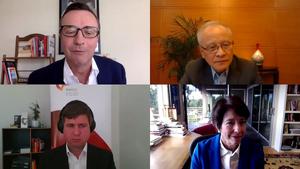 Chinese Ambassador to the US Cui Tiankai (top right) joins a conversation hosted by Bloomberg New Economy Forum on April 22, 2020, sharing his views on China-US relations against the backdrop of fighting COVID-19. (PHOTO / CHINA-EMBASSY.ORG)
Chinese Ambassador to the US Cui Tiankai (top right) joins a conversation hosted by Bloomberg New Economy Forum on April 22, 2020, sharing his views on China-US relations against the backdrop of fighting COVID-19. (PHOTO / CHINA-EMBASSY.ORG)
Politicians and scholars called on Tuesday for China and the United States to work together on a global public health response rather than decoupling amid the novel coronavirus pandemic.
During a virtual panel discussion around the theme of "Risks of US-China 'Decoupling'", held by the Bloomberg New Economy Forum, Chinese Ambassador to the US Cui Tiankai called for "a serious rethinking of the very foundations" of the bilateral relationship at this critical moment.
So I think we really have to think hard. What are the real threats to the globe? What are the real threats to humanity? And what are the shared vulnerabilities for all of us, including for China and the United States, and where do our true common interests lie, and how should we define a relationship on the basis of such perception and recognition?
Cui Tiankai, Chinese ambassador to the US
"For the last few years, there's been so much talk about strategic rivalry among the major powers, perhaps between China and the United States about the so-called Thucydides Trap," he said.
Thucydides, an ancient Athenian historian, wrote about the likelihood of conflict between a rising power and a currently dominant one.
"Look at the situation now. An invisible virus has had such a big impact among all of us; very few people ever anticipated this," Cui said.
"So I think we really have to think hard. What are the real threats to the globe? What are the real threats to humanity? And what are the shared vulnerabilities for all of us, including for China and the United States, and where do our true common interests lie, and how should we define a relationship on the basis of such perception and recognition?" he said.
"So, hopefully, this pandemic will really teach all of us a good lesson," Cui added.
ALSO READ: Envoy: China-US mutual support needed right now
Cui reiterated China's efforts in maintaining transparency in the process of diagnosis, medical treatment and scientific research during the outbreak.
Cui stressed that China always stands for dialogue and is supportive and open to all kinds of mechanisms. He said almost all changes in their relationship were initiated by the US.
"So we've been trying to meet that requirement to adjust," he said.
"Of course, we need more political dialogue and other things, and as for the current priority, a joint effort to combat COVID-19," he said.
Cui said China is making efforts in facilitating the flow of medical supplies to the US.
China has supplied the US with more than 1.4 billion masks, Cui said, equivalent to one mask for every Chinese, some five masks for every US citizen. "I don't think many people are aware of these numbers, but we should do more," he said.
Kevin Rudd, former prime minister of Australia and president of the Asia Society Policy Institute, said the strategic dimensions of the bilateral relationship have continued to unravel, so it would be good to reach "a tactical pause in hostilities" to face the pandemic together.
"Before the COVID-19 crisis began, we had the beginnings of a tactical pause in hostilities with the phase one trade deal. Then COVID arrived, and then everything degenerated rapidly at virtually every level of the US-China relationship," he said.
Rudd said that strategically, the relationship is now in a fundamental state of disrepair. The machinery that had previously existed through the strategic and economic dialogue has virtually been rendered redundant.
He said that "on top of that" are the bilateral criticisms about the origins of the virus. "So the challenge right now is for something to be salvaged out of the ashes of this."
Rudd said right now the two countries should focus mostly on concrete collaboration on vaccine development, "and frankly, collaboration in third countries". He said it's better to address COVID-19 jointly "rather than competitively".
READ MORE: China, US should lead fight against virus
Susan Shirk, research professor and chairwoman of the 21st Century China Center, School of Global Policy and Strategy, at the University of California, San Diego, said, "They need to work together to help the developing world and vaccine development and distribution."
Shirk said efforts have been made by philanthropists like Alibaba co-founder Joe Tsai and universities and scholars including herself to try to build connections to address the immediate needs of medical equipment.
She appealed to "clear away the red tape and the difficulties" to facilitate the movement of medical supplies.
"Believe it or not," she said, the tariffs initiated by US President Donald Trump "still exist on some of this equipment".
Shirk called for cooperation at the governmental level.
"This does have to be led at the leadership level, at the political level, because as we noted earlier, we've seen public opinion growing more hostile, being led by the politicians."
Shirk called Trump's announcement via tweet this week that he will temporarily suspend approvals for US permanent residency "so alien to American tradition. What makes America great is immigration, and the talented people around the world, including, in particular, Chinese people, have been a vital ingredient in American innovation in recent years," she said.


